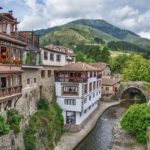What We Can Learn From Galician Christmas

Imagine a Christmas season in which the political debate isn’t over whether it’s appropriate to say ‘Merry Christmas’ or not, but in which language to say it. What may seem like an odd concept to most Americans is the reality for the people of the northwest corner of Spain.
Galicia has two languages that are spoken and officially recognized by the government. But Gallego, the official language of Galicia, was once banned under the Spanish dictatorship, even as recently as 1975. Anyone who spoke in Gallego was making a potentially dangerous political statement against the law. Today however, Galicians proudly exclaim Bo Nadal, Feliz Ano! (Merry Christmas, Happy New Year) in their native tongue. The greeting is even strung up in lights from public buildings.
The main Christmas celebrations don’t begin in Galicia until January 3. In the US, by January, Christmas carols are no longer sung, the stores’ displays have likely changed to Valentine’s Day, and children are back to school. However, I was able to experience all of the Galician Christmas events with my parents in Ourense during the first week of January.
Coming from the United States, which expects strict political correctness from its public employees, it was surprisingly refreshing to spend my holiday season in a country where this isn’t the case. I had been living and teaching in Ourense, a small provincial Galician capital, for three months, and had already observed the ease with which Galicians discussed potentially controversial matters.
Even when it came to religion, everyone from public school teachers to government officials can (and will) proudly express their love of the Christmas season. Understanding this unique zeal, I was disappointed when I found out that family travels would take me out of the region over December 25. I surely thought that all of the beautiful decorations would be taken down and the lively celebrations would have ceased prior to my return on January 2nd.
Galicia has two languages that are spoken and officially recognized by the government. But Gallego, the official language of Galicia, was once banned under the Spanish dictatorship, even as recently as 1975. Anyone who spoke in Gallego was making a potentially dangerous political statement against the law.
Luckily this wasn’t the case. In fact, the main Christmas celebrations didn’t even begin in Galicia until January 3. In the US, by January, Christmas carols are no longer sung, the stores’ displays have likely changed to Valentine’s Day, and children are back to school. However, I was able to experience all of the Galician Christmas events with my parents in Ourense during the first week of January.
Although December 25 in Galicia is spent in a similar way to many American families, this day is not the main attraction for Galician families. The Christmas season in Galicia builds up to its final grand celebration on January 6, or O Día dos Reis Máxicos (Three Kings Day).
On the evening of January 3rd, children from Ourense gather with their families at the Praza Maior (Main Plaza) to submit their letters and wish-lists to the three wise men. The city hall is adorned with Christmas decorations, carols fill the large open plaza, and workers dressed up as postmen pose for photos taken by eager parents, as their children drop their carefully written letters into the mailbox.
On the evening of January 5th, a long procession ensues, starting at the local train station and winding its way through town to its final destination, the main plaza. Families line up along the processional route, filling the streets and overhead apartment balconies, waiting for their yearly glimpse of the wise men. The procession includes each of the three wise men and their respective gift: gold, incense, and myrrh.
Local bagpipe bands and dance groups follow, adding to the charm. Because Ourense is an inland town, the three wise men arrive by train. In some coastal towns, they arrive by boat. Ending their procession through Ourense, the three wise men disappear into the City Hall, followed by a speech from the upper balcony. The speech explains that the wise men have read the Ourensanos’ letters and will be busy delivering gifts later in the night, much to the delight of the wide-eyed children.
On the evening of January 3rd, children from Ourense gather with their families at the Praza Maior (Main Plaza) to submit their letters and wish-lists to the three wise men.
At exactly midnight on January 6, children open the three wise men’s gifts, which have been placed under the tree, and families celebrate well into the night. By January 7, schools have resumed and the normal work schedule begins again.
After eating countless slices of the traditional three kings cake, listening to numerous stories of my students’ gifts (given by the three wise men, of course), and witnessing the highly celebrated procession and letter delivering event, I was enchanted by how Galicians celebrate their holiday season. Christmas isn’t just a time for religious celebration, but for local heritage to be appreciated too.
Galicians don’t allow political correctness to divide them: they celebrate what unites them by proclaiming Bo Nadal from their government buildings, and filling the streets with traditional Galician bagpipes, reminders of what was once prohibited.
Much like observing any holiday in a foreign country, by understanding the political connotations and history of the region, one can better recognize and appreciate the pride that is radiated during the holiday season in Galicia. It was an enriching experience to be able to participate in these traditions with the delightful people of Ourense.
My wish is that every culture’s respective holidays are able to be equally as proud and celebrated as the Galician holidays are; what a beautiful coexistence that would be. Bo Nadal, Feliz Ano, and may the three Reis Máxicos bring you everything on your wish list this upcoming Galician holiday season.
What We Can Learn From Galician Christmas photo credit: unsplash.com. Have you experienced a Galician Christmas? Email us at [email protected] to share your experience.








